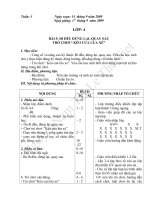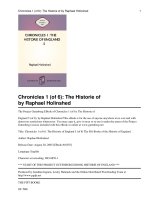- Trang chủ >>
- Mầm non - Tiểu học >>
- Lớp 5
5 5 5 the gold rush of 1849 TG
Bạn đang xem bản rút gọn của tài liệu. Xem và tải ngay bản đầy đủ của tài liệu tại đây (116.48 KB, 4 trang )
5.5.5
The Gold Rush of 1849
SUMMARY
This article describes the allure of
the Gold Rush of 1849 in California. It discusses why so many people risked everything
to go there. It describes the risks and rewards
involved in searching for gold. It relates the
Gold Rush to the history of California. The
book is filled with vivid illustrations and photographs from the period.
LESSON VOCABULARY
economic
independence
recalled
vacant
freight
overrun
scrawled
ventured
INTRODUCE THE BOOK
INTRODUCE THE TITLE AND AUTHOR
Discuss with
students the title and the author of The Gold
Rush of 1849. Ask students to think about the
title and what the book will be about. Have
them look at the illustration on the cover of
the book and ask if it gives them further clues
about the book’s content.
BUILD BACKGROUND
Discuss what the students know about the California Gold Rush
of 1849. Have any of the students visited
a ghost town?
PREVIEW/USE TEXT FEATURES
Encourage students to study the illustrations in the book.
Discuss how the illustrations, photographs,
and maps help to make vivid the lives of
those who came in search of gold.
108
GENERALIZE
GRAPHIC ORGANIZERS
READ THE BOOK
SET PURPOSE
Most students will be interested
in reading this book so that they can find out
more about the Gold Rush of 1849.
STRATEGY SUPPORT: GRAPHIC ORGANIZERS
Suggest that students draw a simple graphic
organizer as they read the book to help them
understand ideas that seem difficult. They
can create a chart in which they jot down
details as they read.
COMPREHENSION QUESTIONS
PAGE 5 Who controlled California in the early
1840s? (Mexico)
PAGE 6
How did John Sutter dream of making
his fortune? (in farming)
PAGE 8
What was James Marshall building
when he discovered gold? (a sawmill)
PAGE 10 How did Sam Brannan make his
fortune? (by selling gold mining tools)
PAGE 20
What were the miners’ towns called
that had been left vacant after the Gold
Rush? (ghost towns)
PAGE 22
Name a few of the other states where
gold was discovered. (Alaska, Arizona, Idaho,
Montana, Nevada, New Mexico, South Dakota,
Utah, and Wyoming)
The Gold Rush of 1849
16911_LRD_TG_108-109 108
11/17/05 9:01:10 AM
REVISIT THE BOOK
READER RESPONSE
1. Possible response: Most people were not
successful because there wasn’t as much
gold as people hoped. Some of the most
successful people were those who sold
equipment to the miners.
2. Possible responses: California Before the
Gold Rush: Only 5,000 people living there
in the early 1840s; not a state.
California After the Gold Rush: Three years
after the Gold Rush, there were 250,000
living in California; California became a
state in 1850.
3. The prefix of independence is in. It changes the word dependence to an opposite
meaning. The prefix of recalled is re. It
changes the word called to mean call again.
Sentences will vary.
4. Responses vary.
EXTEND UNDERSTANDING
Have students look
at the maps on pages 14–15. Ask students
if these maps help them understand more
clearly how the miners traveled to California
during the Gold Rush of 1849.
RESPONSE OPTIONS
WRITING
Have the students write a letter from
the point of view of a miner. They are sending
a letter home about their adventures traveling
to California and the results of their search
for gold.
SOCIAL STUDIES
CONNECTION
Have students
research the history of
the California-Oregon Trail. When
did people start crossing to the West on this
trail. How long did the journey take? They can
use the Internet or the library.
Skill Work
TEACH/REVIEW VOCABULARY
Go over the meaning of the vocabulary
words. Tell students you have chosen a
mystery word and it is their job to guess
what the word is, based on two clues about
the word. (For example: Which words can
be broken into two separate words?
over-run, in-dependence) Create mystery
words for all other vocabulary words.
Ask your ELL students if any of them
have been to California. If they have, have
them describe what they saw there.
TARGET SKILL AND STRATEGY
GENERALIZE As this book presents a
number of facts and figures about thousands
of people who rushed to California in 1849,
students will need to organize these facts to
generalize. To express what the gold miners
have in common, students’ generalizations
should show likenesses by using clue words
such as many, most, generally, and overall.
GRAPHIC ORGANIZERS Remind students
that graphic organizers are used to organize
information in a visual way. Have students
create a before and after chart by taking a
piece of lined paper and drawing a line down
the center. Have them write Hopes over the
left-hand column, and Reality over the righthand column. Then as they read, have them
enter what the miners hoped to find before
they arrived out West, and what they found
once they got there.
ADDITIONAL SKILL INSTRUCTION
MAIN IDEAS AND DETAILS
Remind students
that each text can be boiled down to a
number of main ideas. Remind students
that each of the main ideas will be supported
by a number of supporting details. As they
read, have them think about what are the
main ideas of The Gold Rush of 1849.
The Gold Rush of 1849
16911_LRD_TG_108-109 109
109
12/2/05 12:45:41 PM
The Gold Rush of 1849
Name
Generalize
• A generalization is a broad statement or rule that applies to many examples.
• A generalization is made after thinking about a number of examples or facts and what they
have in common.
1.
Some made the journey by boat and others by land.
2.
The Mexican government gave a land grant to Sutter.
3.
Sutter built a huge complex.
4.
The people seeking gold destroyed his fort and crops.
5.
Many people from the East chose to travel by boat to California.
6.
Many travelers got seasick.
7.
Although many people gave up and left town, thousands stayed.
8.
California now had its independence from Mexico, but was not yet
a state.
9.
The fort has sleeping quarters, a bakery, blanket factory, blacksmith
shop, and carpenter shop.
10.
Sam Brennan was a San Francisco merchant.
11.
Unfortunately, many people found very little gold or none at all.
12.
Gold was easy to find in the waters of the American River.
13.
The first people to find gold became rich.
© Pearson Education 5
Directions Tell whether each of the following is a broad statement or a specific statement.
110
16911_LRD_TG_110-111 1
12/2/05 12:46:52 PM
The Gold Rush of 1849
Name
Vocabulary
Directions Write the word from the box that has the same meaning as the underlined word or
phrase in the sentence.
Check the Words You Know
© Pearson Education 5
economic
independence
recalled
vacant
freight
overrun
scrawled
ventured
1.
In the evenings, the miners sometimes quickly wrote letters home.
2.
The empty towns became known as ghost towns.
3.
In 1847, California had won its freedom from Mexico, but was not yet
a state.
4.
Many left their homes and families and braved going to California.
5.
Many miners endured a lonely life in the hope of money-related gain.
6.
The mining camp was filled to the brim with people looking for gold.
7.
Men felt homesick when they remembered the life they had before
coming west.
8.
Traders had to haul their transported goods by wagon or boat.
Directions For each set, write the word that does not belong.
9.
full, overrun, vacant
10.
scrawled, sang, wrote
11.
hid, braved, ventured
111
16911_LRD_TG_110-111 2
12/2/05 12:46:54 PM









